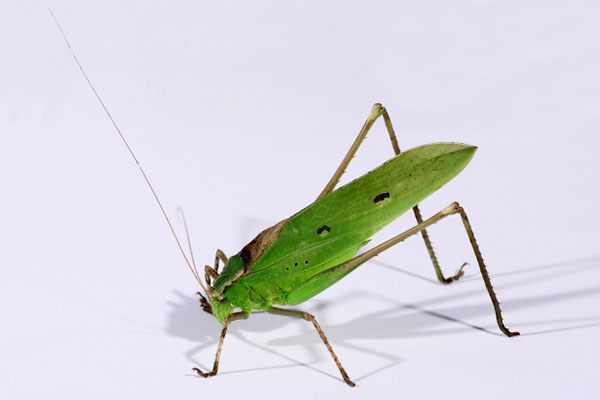Die Schwierigkeit, in lautem Stimmengewirr einem einzelnen Gespräch zu folgen, ist als „Cocktail-Party-Problem“ bekannt. Auch viele Tiere stehen vor einer ähnlichen Situation. So müssen zum Beispiel Heuschrecken im tropischen Regenwald im Lärm anderer Arten die Gesänge ihrer eigenen Männchen hören. Wie das Nervensystem dieser Insekten das möglich macht, haben Zoologen der Karl-Franzens-Universität Graz an der Laubheuschrecke Mecopoda elongata untersucht und dabei erstmals einen neuronalen Mechanismus entdeckt, durch den die Insekten den arteigenen Gesang aus allen anderen Lauten herausfiltern. Die Arbeit wurde kürzlich in der angesehenen Fachzeitschrift „The Journal of Neuroscience“ publiziert.
Mecopoda elongata hat’s besonders schwer. Denn der Gesang der Männchen dieser tropischen Laubheuschrecke wird von einer anderen Art gestört, die mit ohrenbetäubenden 100 Dezibel – vergleichbar mit einem Presslufthammer – zirpt. Hinzu kommt, dass beide den gleichen breitbandigen Frequenzbereich von 2 bis 70 Kilohertz (kHz) nutzen. Außerdem sind die Laute von Mecopoda elongata leiser und kürzer als jene der Konkurrenz. Trotzdem gelingt die innerartliche Kommunikation. Ein Rätsel, das Forscher vom Institut für Zoologie der Uni Graz nun lösen konnten.
In Verhaltensversuchen können Artgenossen sich trotz des Hintergrundlärms verständigen. „Wir haben entdeckt, dass der Gesang von Mecopoda elongata bei der Frequenz von genau 2 kHz lauter ist als jener der störenden Art“, berichtet Dr. Konstantinos Kostarakos, Erstautor der Publikation. Wird jedoch die Lautstärke bei 2 kHz reduziert, funktioniert die Kommunikation nicht mehr. Gleichzeitig konnten wir feststellen, dass die Heuschrecke Sinneszellen im Gehörorgan hat, die auf 2 kHz abgestimmt sind.“ Das heißt, die ein bis drei Sinneszellen, die auf diese Frequenz ansprechen, sind von besonderer Bedeutung. Von ihnen gelangt die Information dann über Nervenzellen ins Gehirn zur weiteren Verarbeitung. Diese Nervenzellen sind ebenfalls auf 2 kHz spezialisiert.
„Die Sinnes- und Nervenzellen von Mecopoda elongata und den anderen Heuschrecken sind nicht grundsätzlich verschieden, aber sie machen sich den kleinen Unterschied bei 2 kHz für das Hören unter extremen Lärmbedingungen zunutze“, fasst O.Univ.-Prof. Dr. Heiner Römer, Leiter der Arbeitsgruppe Verhalten & Neurobiologie, eine zentrale Erkenntnis der Forschungen zusammen.
Die untersuchte Heuschrecke hat nur 40 Sinneszellen in ihrem Gehörorgan, das sich in den Vorderbeinen befindet. Im Vergleich dazu: Im Ohr des Menschen sind es etwa 13.000. Doch Hören und die nervöse Verarbeitung funktioniert bei allen Lebewesen im Prinzip gleich. Somit könnte der von den Grazer Zoologen entdeckte Mechanismus unter anderem auch in der menschlichen Kommunikation eine wesentliche Rolle bei der Lösung des Cocktail-Party-Problems spielen.
Publikation:
Neural Mechanisms for Acoustic Signal Detection under Strong Masking in an Insect
Konstantinos Kostarakos and Heiner Römer
The Journal of Neuroscience, 22 July 2015, 35(29):10562-10571; doi:10.1523/JNEUROSCI.0913-15.2015
